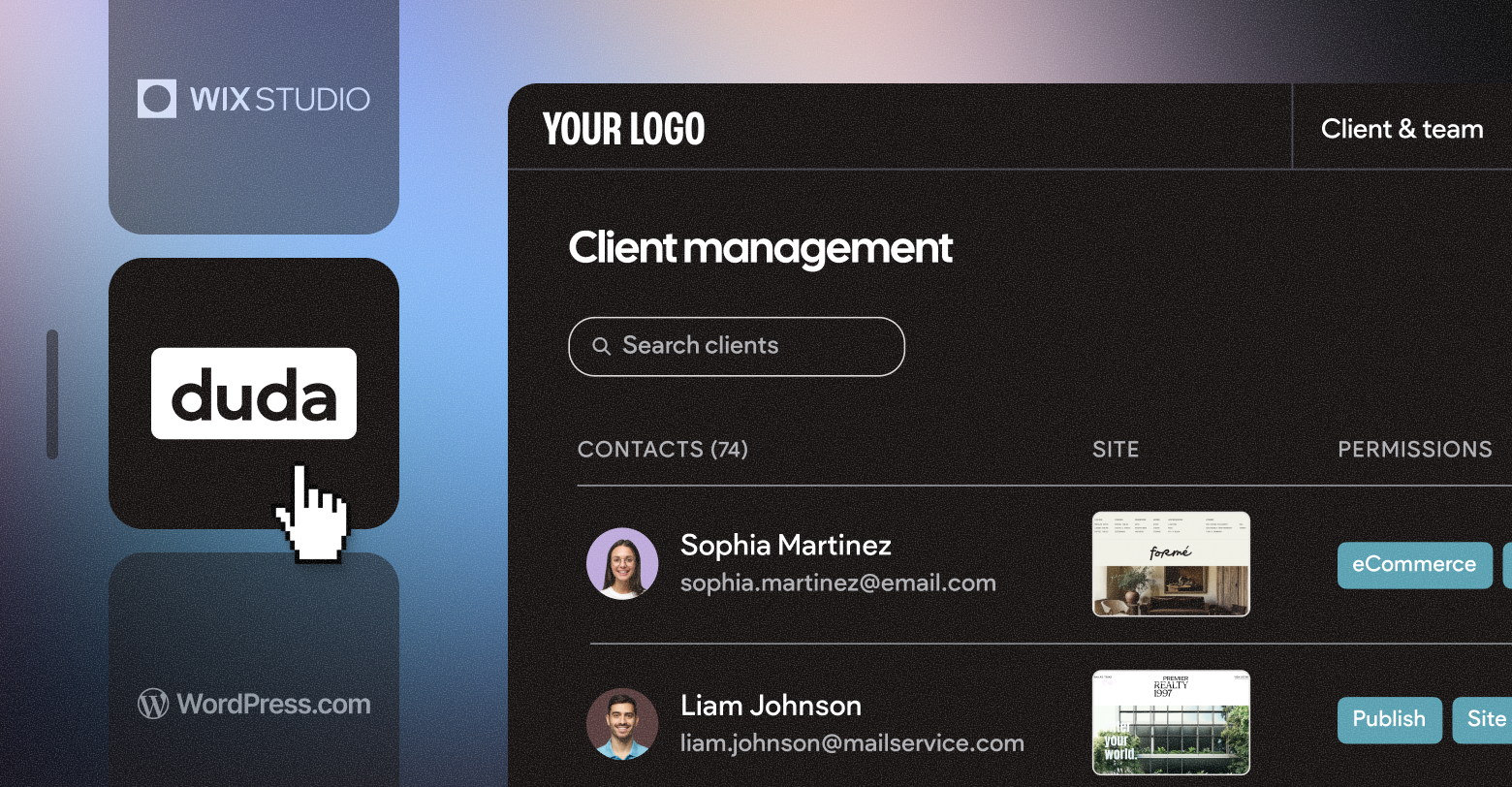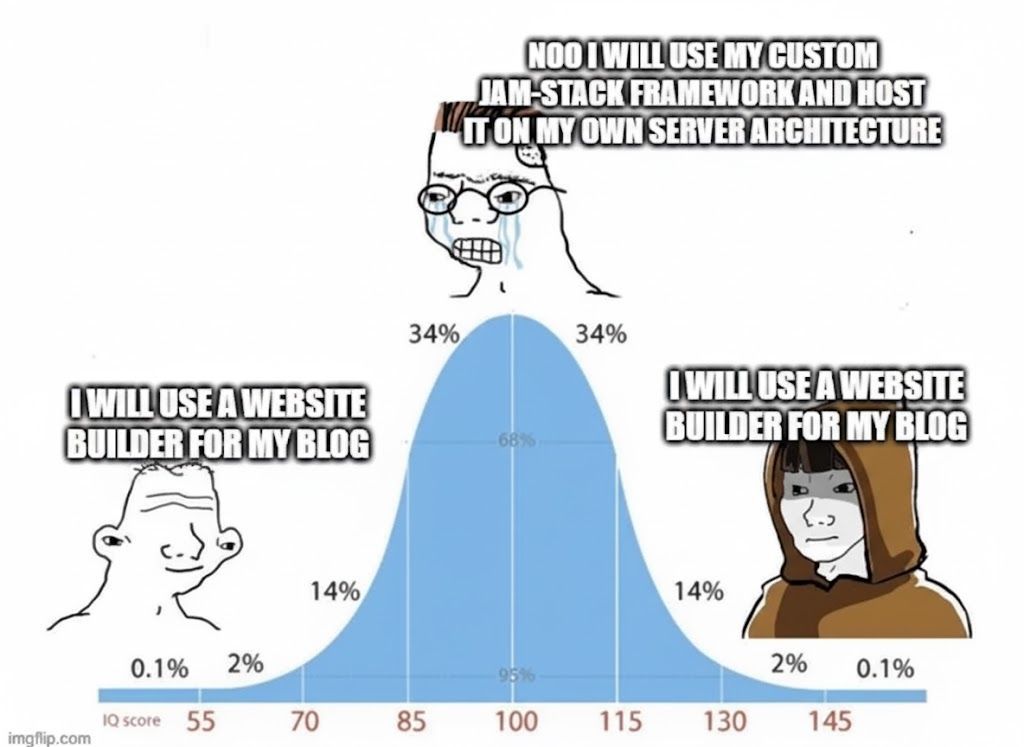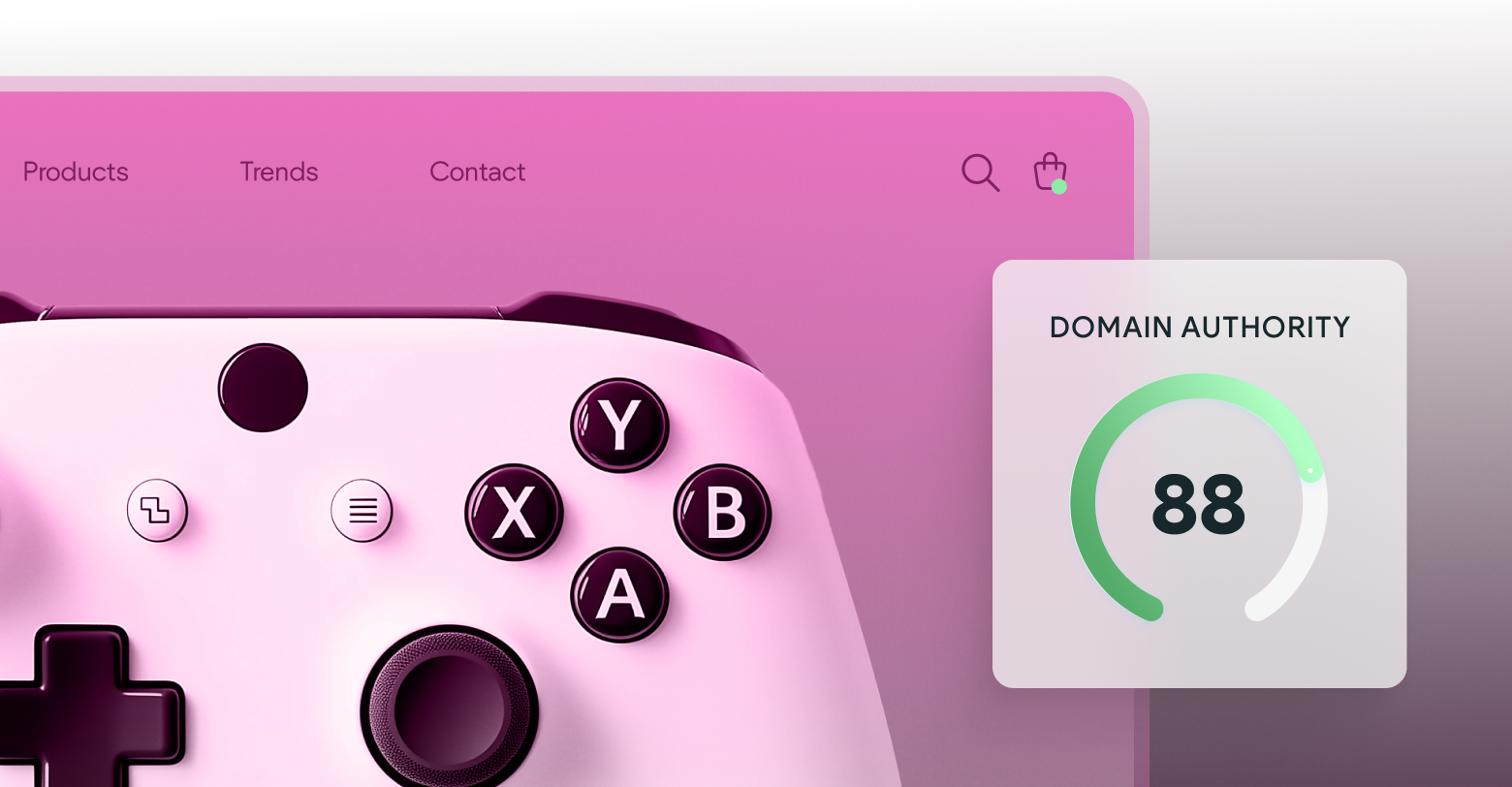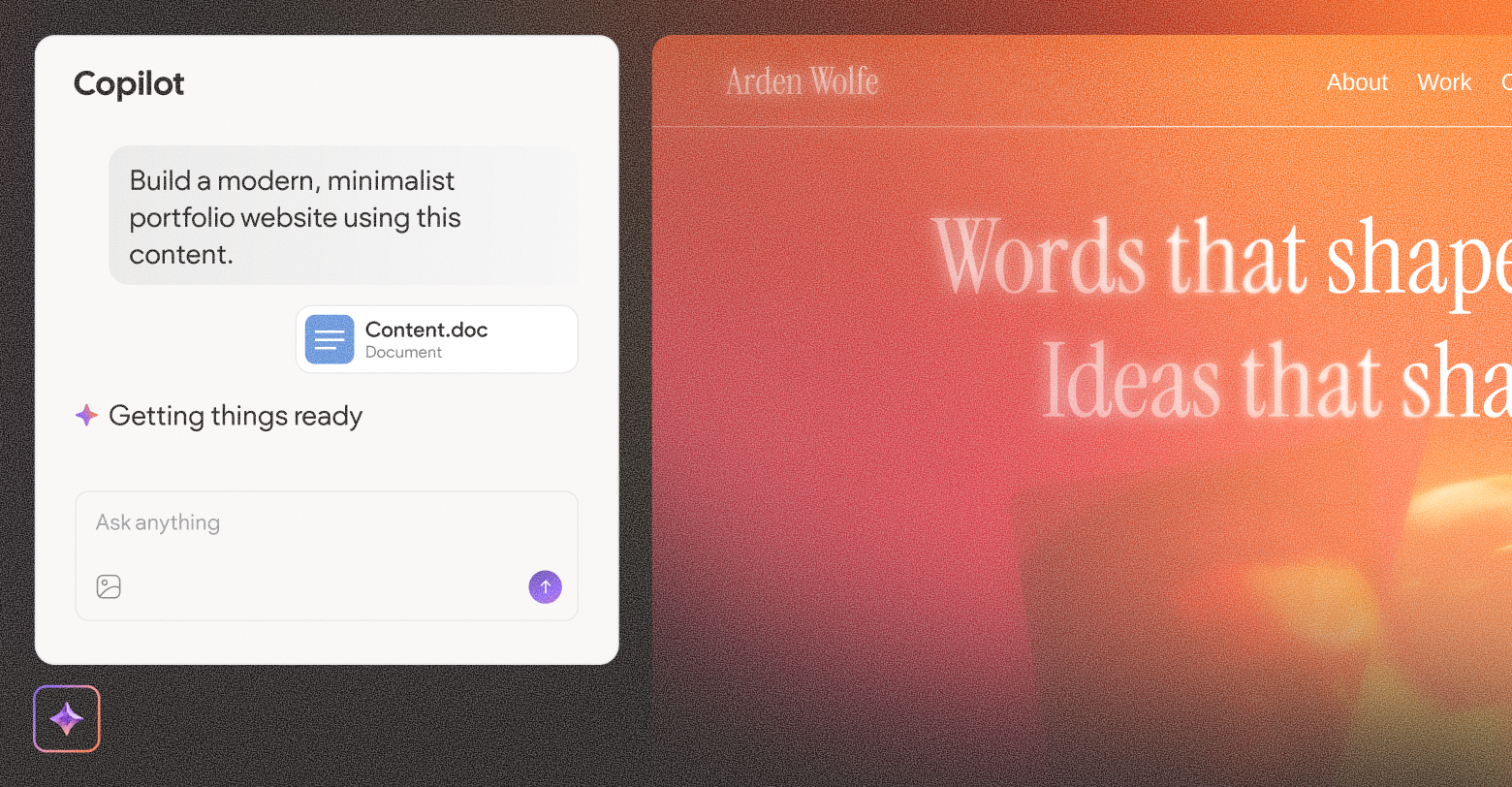Small and midsize digital agencies win on speed, reliability, and client experience. Not on maintaining servers or wrangling plugin conflicts. Agencies don’t just “need a website builder.” You need a revenue engine. One that ships beautiful sites fast, scales across a multitude of clients, and doesn’t implode your margins when your operations expand.
Before we compare the top three contenders for digital marketing agency website builders, let’s review what website builders are, and how digital agencies use them.
Website builders - who needs them anyway?
At their core, website builders are online WYSIWYG editors. They are platforms originally designed to let anyone build and publish a website without writing HTML or JavaScript. Over time, website builders have grown beyond basic drag-and-drop tools into full digital ecosystems that offer extensions, integrations, hosting services, and collaboration features. The next leap came with multi-site website builders and cloud-based storage, which opened the door for small and mid-sized digital marketing agencies to scale their services.
For these agencies, the combination of multi-site scalability and low-code (or no-code) website production is vital for delivering digital marketing services. This is why many agencies regard website builders as revenue engines.
The goal of website builders in agency operations is to make it easier for digital marketing professionals to focus on what they do best - client-facing work that drives growth. Instead of hiring expensive engineering teams, a comprehensive website builder platform offloads most coding and maintenance tasks onto third-party service providers.
That said, website builders come in a variety of flavors with varying degrees of flexibility and overhead. WordPress is a prime example: when self-hosted, it offers near-total control but demands significant technical expertise and ongoing maintenance. This trade-off makes it powerful but resource-intensive, and better suited to agencies with in-house developers and infrastructure specialists.
Most agencies, however, don’t need to build complex custom web applications from scratch. And in a world where cloud-based platforms deliver higher reliability with far less overhead, self-hosting is increasingly impractical. For the majority of agencies, the smarter path is choosing a scalable, cost-effective platform that allows them to deliver polished websites quickly, manage them at scale, and free their teams from the complexity of servers, plugins, or security patches.
How to choose the right website builder for your agency
Website builders target different users. Some are designed for solo entrepreneurs, others for hobbyists, and only a handful truly fit the needs of digital marketing agencies. Picking the right website builder for your agency comes down to how well the platform aligns with your business model and growth goals.
When evaluating the options, focus on six key criteria:
Scalability & multi-site management
A website builder platform should make it easy to manage dozens or even hundreds of client websites from a single dashboard. Features like bulk updates, client account management, centralized permissions, and streamlined billing can save hours of overhead.
Hosting, speed, and security
Clients expect fast load times and reliable uptime. Agencies shouldn’t have to worry about patching servers or chasing down performance bottlenecks. Look for platforms that provide built-in hosting, global CDN coverage, SSL, code vitals, performance benchmarks, and automatic security updates.
Client collaboration & white labeling
Whose website is it anyway? Some clients want full control of the content and even some technical aspects, while others demand the agency handles everything. A strong website builder lets agencies brand the platform as their own, provide customized client dashboards, and set role-based permissions so clients can work on their site without breaking things.
Support & training resources
Access to responsive support and ongoing training is critical, especially for small and midsized agencies without full-time developers on staff. Moreover, training resources for customers that promote self-service and can be white-labled by the agency can save time your teams spend doing things the clients can do for themselves.
Cost structure & total ROI
Making a website builder a true revenue engine requires careful calculation to find the right platform that delivers predictable margins as you scale. Consider not only up-front costs and subscription fees, but also hidden costs like maintenance, third-party add-on licenses, and unexpected infrastructure costs when client websites get spikes in traffic.
Flexibility & integrations
A website builder doesn’t exist in a vacuum. It works with systems and platforms that agencies and their clients already use - from analytics and CRM to marketing automation and SEO tools. Choose a solution that works with your agency’s tech stack and integrates smoothly with your clients’ systems.
Website builders for digital marketing agencies: Comparing Duda vs Wix Studio vs Wordpress
Wix Studio: Best for unmanaged websites
Wix Studio is Wix’s answer to the agency market - a premium subscription tier designed to compete with platforms like Duda by offering collaborative design tools, flexible templates, and integrated hosting. Positioned as a creative suite for designers, Wix Studio emphasizes visual freedom and AI-powered tools.
Strengths
- Creative flexibility: Wix Studio employs Wix’s hallmark drag-and-drop editor with advanced animation and responsive layout options, giving designers a high degree of creative flexibility with zero code.
- Reliable hosting and performance: Platform and website hosting is included, along with CDN coverage and automatic scaling for traffic spikes.
- AI-driven workflows: Automated design adjustment tools and genAI functionalities can help small teams deliver websites faster.
Limitations
- Operational frictions at multi-site scale: Wix Studio grew out of a standalone builder designed for solo users. While it now offers some multi-site features, reviewers stress it falls short of what agencies need to manage dozens of sites efficiently. One of the issues is that Wix Classic and Studio are separate products, so moving work often means rebuilding or as
users described it: “The same site can’t have a page on Wix and one on Studio.”
- Support frustrations: Agencies
often cite Wix’s customer support as slow or inconsistent. In addition to being frustrating, such lack of responsiveness can have a cascade effect, causing delays and lost revenues for clients. “Nobody is available for live chat… I managed to get a call after waiting nearly 50 minutes,”
wrote one user.
- Limited client self-service and collaboration:
Reviewers note that while Wix Studio offers shared workspaces for agency-client collaboration, it lacks the client access controls and white-labeling options that agencies need to maintain brand consistency. Moreover,
many users complain of editor stability, responsive scaling issues, and
usability of the Wix Studio product.
Pricing
Wix Studio pricing is usage-based, with public tiers starting at $17/month (annual billing) for the most basic package, and scaling by bandwidth, storage, and features. For digital marketing agencies, anything below the Business tier would not suffice.
Users note that the pricing scheme is unsuitable for growing agencies or web app developers, stating that “Wix is charging web developers consumer RETAIL prices on hosting, which leaves absolutely no profit margin for web designers.”
If you choose Wix Studio as the website building platform for your agency, it is important to keep an eye on costs as they can balloon quickly with growing client bases, especially when add-ons or third-party apps are required.
Agency perspective
For agencies focused primarily on design and a small number of managed sites, Wix Studio can be an appealing option. But the recurring agency feedback (operational friction, support delays, editor instability, and pricing pressure) makes it harder to scale operations. As one long-time user
summed it up: “Okay in reality for very simple basic websites.”
WordPress: Best for highly technical agencies
WordPress is a flexibility and customization powerhouse. Originally built as a blogging platform, WordPress is open-source, with an extensive plugin ecosystem and fully under your control - from hosting to code and everything in between. This sort of power suits developer-led agencies with clients that require extensive customization down to the smallest technical details of their website. It also means that you are responsible for updates, uptime, performance, security, and governance.
Strengths
- Maximum control and ownership: Full access to code (PHP), themes, plugins, and freedom to choose any stack or host you prefer.
- Extensive ecosystem: WordPress has been around long enough to grow a market for plugins, integrations, and themes designed for complex builds and unusual use cases.
- Developer tooling support: Mature tooling and extensive integration and deployment options including ACF/blocks, WP-CLI, CI/CD, Bedrock and headless patterns.
Limitations
- Maintenance risk: At portfolio scale, updates turn into an ongoing operational chore - staging, rollbacks, QA, regression checks, etc. If you skip the updates, you’ll be faced with security issues that will leave your WordPress websites vulnerable to hackers. That’s why abandoned WordPress sites are often
hacked and used by malefactors to spread malware. Running the updates comes with its own issues as they can sometimes
break websites. The maintenance challenge becomes even harder if you consider plugin sprawl, with users
complaining that “Every plugin is a minefield… whatever I touch breaks the site.”
- Performance/UI issues: Core Web Vitals and the user experience depend fully on your stack - the hosting, theme architecture, caching, and the number and strict plugin discipline. When it comes to using the platform, non-technical editors face a steeper learning curve and can inadvertently degrade performance or break layouts. This can be especially challenging with co-managed websites, where clients have admin access to their WP instance but lack the technical know-how to keep things working smoothly. As
one user put it: “Installed 6 random plugins… changed the theme… now it’s chaos.” Another
described building websites with WordPress as “a minefield of poorly built plugins and bloated page-builders.”
- Weak multisite support: WP Multisite enables centralized updates and some hosting costs saving, but couples tenants in a way that makes it extraordinarily hard to manage at scale, especially with varying customer requirements. Moreover, multisite can expose all client websites by allowing attackers to move laterally in your servers, turning a malicious compromise into a full takeover. Many
agencies admit to splitting away instances as “The headaches from varying customer demands weren’t worth the savings… it only had about 15 sites so I separated them.”
Pricing
Varying. WordPress is open source and the software itself is free, making it automatically attractive to those without a budget for a professional agency-centric website builder. However, the real costs of running multiple WP instances quickly add up. There’s managed hosting, premium themes and plugin licenses, as well as ongoing maintenance time for updates, backups, monitoring, incident response, and debugging. Margins can be improved with a standardized base stack, low plugin count, and maintenance retainers across your client base.
Agency perspective
WordPress is often the right tool for developer-led agencies building websites with bespoke functionality (like custom schemas, headless deployment, and complex integrations). However, if you’re looking for a design-led, multi-site service with minimal engineering overhead, the strengths of WordPress and the freedom it enables turn into heavy operational friction, and ballooning expenses.
Duda: Best for agency growth
Duda is designed from the base up to serve professionals in agencies, freelancers, and SaaS teams who launch, manage, and scale a large volume of client sites with low operational overhead. Duda’s platform features high-end multi-site management, white labeling, client collaboration, built-in cloud hosting, security, automation, and more - all in one user-friendly stack that lets your teams focus on creativity and revenue work instead of maintaining servers or wrangling plugin stacks..
Strengths
- Agency-centric features: Duda lets you manage all client sites from a single dashboard, and invite users per client sites with granular, role-based permissions. In addition, your clients and their customers don’t need to ever know of Duda with full platform branding including custom platform domain, branded login, white-labeled editor, branded help, and custom email domain for all client communications. You can even bill your clients directly through the Duda platform. You can execute one-time billing or recurring subscriptions through Stripe. Duda doesn’t add transaction fees (Stripe’s own fees apply).
Users say: “Duda is the best out there for building and providing clients access without major chances of breaking the site.”
- Hosting, speed, and reliability baked-in: Duda’s plans include AWS hosting with 99.99% uptime SLA, and unlimited storage and bandwidth across tiers. This means performance and availability are not your headache. In addition, Duda is
repeatedly praised by users for its 24/7 support, as well as stellar performance and speed.
One user wrote: “We focus heavily on SEO, so site speeds and health matter - we experience better site metrics to that of WP sites we manage or others. Websites produced using Duda account are more sleek and less clunky, and take us less time to produce, less maintenance over time.”
- Dynamic content and integrations: Create dynamic pages backed by Collections, connect your Google Sheets or Airtable directly, or import external datasets via API, updating flow to pages automatically. You can also leverage advanced automation and integration options with APIs and webhooks, and extend sites via the App Store and Connectors (to your favorite CRM, email, and analytics providers).
- Scalability, flexibility and customization: User-friendly on the outside, Duda’s platform is just as developer-friendly with Developer Mode letting you edit HTML/CSS, build custom widgets with HTML/CSS/JS (with server-rendered HTML via Handlebars), and export your site code.
Limitations
- SaaS guardrails vs. raw control: You can customize deeply with Developer Mode, custom widgets, HTML/CSS, and APIs, but Duda is not self-hosted. So if you’re looking for complete freedom and control - Duda might not be for you, as you don’t get root/server control or access to the breadth of WordPress-style plugins online. If your agency model demands low-level backend customization, a self-hosted CMS will offer more latitude.
- Limited blogging features: Duda is not intended for the management of multiple media or publishing websites, and some
users report that the blog module falls short when it comes to clients with complex content strategies, as well as deeper CMS relationships. There’s no native blog commenting in Duda, so you will need to add a third party plugin like
Disqus per post, which is fine for some stacks but adds steps.
- Specific economics model: Pricing is plan-based with included site credits and the ability to add more sites, with App Store add-ons priced per provider. With a somewhat complex pricing scheme, using Duda as a revenue engine means agencies should model margins across dozens or hundreds of sites (hosting is bundled, but per-site licenses still matter).
Pricing
Duda
pricing starts at $19/month for a single website, and scales through Team, Agency, and White Label tiers. Custom tiers and plans are available.
Agency perspective
If your business growth depends on quick site production, frictionless client collaboration, and centralized agency-centric features (like billing and white-label UX), Duda is your one-stop-shop for what many agencies typically stitch together from multiple tools.
For designer-led teams or ops-lean agencies, that consolidation translates to focus and margin. If your agency model is developer-led with heavy backend customization, weigh Duda’s guardrails against the freedom (and maintenance burden) of a self-hosted website builder suite.








